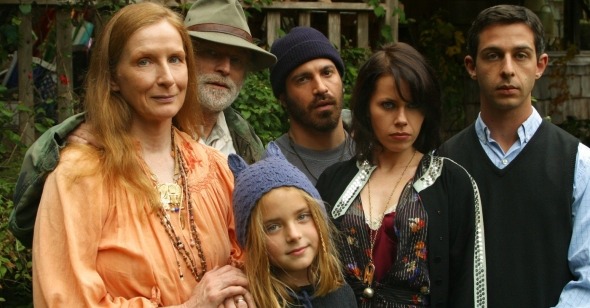Easy Bake
by Kristi Mitsuda
Humboldt County
Dir. Darren Grodsky and Danny Jacobs, U.S., Magnolia Pictures
From its simple title font evocative of another era to its opening and closing shots reminiscent of The Graduate to its casting of filmmaking icon Peter Bogdanovich, Humboldt County acknowledges its immodest aims early on. Taking as their subject matter a happy, hippie hideaway in the marijuana-rich forests of Northern California, writing and directing team Danny Jacobs and Darren Grodsky seem to believe that representation of the unconventional marks their debut effort as such, but the film fails to break any new aesthetic or narrative ground.
Although the film is promising in fits and starts, its trajectory is predetermined by generic convention from the start. Opening scenes find empty-shell medical student Peter (Jeremy Strong) at a particularly low moment: Having just failed a final exam (conducted by his professor and father, played by Bogdanovich) after prescribing Paxil in response to a mock patient’s suicidal ruminations, he arrives at a proverbial crossroads. Numb and now aimless, he accepts an invitation from Bogart (Fairuza Balk), the actress formerly known as the depressed damsel in need of doctoring, to meet at a jazz club where she performs. An awkward sexual encounter later, Peter accepts a ride back to her place, not realizing Bogart doesn’t reside in the greater Los Angeles area but hours north in Humboldt County.
Given her unusual name, and Balk’s infectious live-hard, lusty demeanor, Bogart would seem to serve as catalyst for Peter’s reawakening to the wonders of the world in the vein of the “Manic Pixie Dream Girl” who, as incisively coined and defined by the Onion’s Nathan Rabin some time ago in response to Kirsten Dunst in Elizabethtown, “exists solely in the fevered imaginations of sensitive writer-directors to teach broodingly soulful young men to embrace life and its infinite mysteries and adventures.” Bogart certainly fits that bill, but you soon realize she’s a narrative red herring when she ditches Peter the day after bringing him to her makeshift family’s home in the woods. Though the story continues on its original path towards the straight arrow’s enlightened mellowing, it shifts to become a journey abetted not by a quirk-ridden woman, but by the particular plant—and the culture which surrounds it—for which Humboldt County is so well-known.
Peter’s rejuvenation begins almost immediately. Stranded with Bogart’s on-again-off-again boyfriend, Max (Chris Messina), and his pot-farming family—comprised of young daughter Charity (Madison Davenport) and parents Rosie and Jack (Frances Conroy and Brad Dourif)—Peter grows increasingly more comfortable, taking to their warm openness. Released from the fluorescent lighting and claustrophobic spaces associated with L.A., Humboldt County visually opens up to include expansive shots of the Lost Coast’s lush beauty. The traditional dichotomy between the big, bad city and idyllic countryside asserts itself, and, unsurprisingly, Peter’s communion with nature solidifies with his first THC-high. After taking a couple of tokes, he claims not to feel anything but continues to ramble on to Max before, clearly stoned, he lays down and basks in the sensation of the sun on his face with newfound appreciation. Contrasted with the usual heightened silliness that accompanies cinematic highs, this is a lovely, unfettered moment. But for every such scene, there’s another counteracting the realism with clichéd romanticization, as evidenced in the following sequence, which shows the family convened in the low-lit living room as Rosie sings along to Jack’s piano-playing, Peter dancing with Charity while Max looks on.
What makes Humboldt County more intriguing than this description suggests is its sidelong glance towards a road not taken. After Bogart leaves, a close friendship develops between Peter and Max; hints of a deeper attraction between the two stirs as a musical montage juxtaposes intimate two-shots (and sometimes three-shots, with Charity between the men) with wide-shots set against a golden sun. Peter urges Max to return to L.A. with him after the two get busted by the local cops and are let off with a warning, to which the latter jokes, “That could be cool . . . Get married, you and I; dinner parties . . . we could join a gym.” Is the unspoken homoerotic subtext in the buddy stoner movie about to be made explicit, you wonder? Will Humboldt County earnestly go where Pineapple Express refuses to, despite its constant ribbing? Sadly, no such bold, revisionist spine is to be found here.Instead the film devolves into histrionics, culminating in a punitive conclusion that seems at odds with its previously celebratory ode to the healing properties of cannabis and the community it fosters. Humboldt County flip-flops from being a marijuana advocacy dramedy ready to rock double-feature status alongside Grass at future hempfests the world over and ends up a morality tale with Consequences. That it sees only these two extremes as possible outcomes is indicative of its ultimately simplistic formulation.
